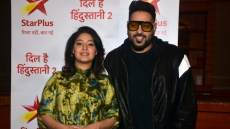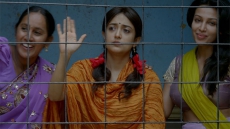Film celebrities like Onir, Celina Jaitly, Nandita Das and Apurva Asrani want the "archaic" Section 377 of the Indian Penal Code to be repealed, and the LGBT community given justice and inclusion.
On Thursday, the Supreme Court said that all the discrimination against the LGBT community will be go once Section 377 is declared unconstitutional.
Here's what the celebrities said:
Actress-activist Celina Jaitly: Justice to the LGBTQI of India is long overdue. In India, we have an archaic relic of a law, Section 377, which has put the entire Indian LGBT community in direct line of fire. This law can be and is being used to blackmail, violate, abuse the people of the LGBT community on a daily basis in workplaces, in day-to-day lives and majorly hinders the work of health workers in field of HIV/Aids.
Laws are meant and made to protect us, not to form a platform for fanatics to blackmail, abuse, traumatise, violate and humiliate millions of LGBTQI of this country. In India, that is what 377 is unfortunately perpetrating. When these same abuses are perpetrated against members of any other group of people, states rightly push hard for a more vigorous response. However, when it comes to the LGBT community, why should the resolve not be the same?

People are harassed for their orientation on a daily basis, but you would not know it unless you were the victim or a close friend/relative of one. The entire community has been ostracised due to an archaic law and modern-day collapse of an ability to evolve and grow and embrace equality and right to life.
The fact is that only the law/legal system can break centuries of social stigma and religious ostracism (just like 'sati' had to be abolished). In India, Section 377 provides a legal platform to segregate the entire LGBTQI from the rest of the bonafide citizens.
The laws of the world's largest democracy must ensure that no one should be left out or excluded when it comes to basic human rights. There is no subset of rights or new category of rights called ‘LGBT rights'. LGBT people are entitled to the same rights as everyone else. Until each and every Indian is not given their basic human life with dignity, India cannot claim to be truly free.
Actress-activist Nandita Das: When will we grow up as a society and embrace reality with compassion and understanding and not with prejudice and judgement? The archaic law that criminalises homosexuality is shameful. The impending decriminalisation of homosexuality by repealing Section 377 is imperative.

It is long overdue. In times when we should be fighting hate -- stopping lynchings, abuse and discrimination against absolutely anyone -- it is shocking that some want to stop people from loving. Freedom to live and love with dignity ought to be for all."
Filmmaker Onir: Long overdue... Though it would have been so much better if the government had supported the petition. But the fact that the government is not opposing it, is heartening. I am hopeful that the Supreme Court will do the right thing and make this nation a truly democratic nation which upholds the constitutional rights of all citizens irrespective of sexual preferences of consenting adults. This would be a step forward towards further ensuring the civil rights of the community. Much respect for all those who have been for years tirelessly working for this.

Writer, director, editor Apurva Asrani: It is about time India left the company of countries like Iran, Iraq and Afghanistan that criminalises same-sex relations and joined the ranks of developed nations such us the US, UK and Australia that value human rights. A sizeable number of Indian citizens belonging to the LGBTQ community deserve a life of dignity and respect, just like everyone else.
After the travesty of justice in the Supreme Court's 2013 hearing, where homosexuality was re-criminalised, many of us felt letdown. But it also had a galvanising effect. The highest court called the LGBTQ a 'minuscule minority' while stripping it of any deserved recognition. That's when many of us decided to come out publicly and show the country that we are anything but a neglible minority.
I have a good feeling that we will win this case. And I hope more people from the film industry will then find the courage to come out and empower the people who look upto them.





